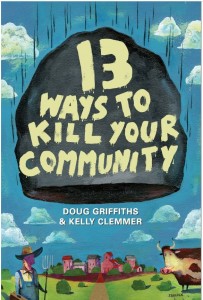A Placemaking Journal
13 Ways to Kill Your Community
Not so long ago, fellow urban scribe and recently elected mayor of Concrete, Washington, Jason Miller, recommended the book, “13 Ways to Kill Your Community.” The timing was fortuitous. For a while, in an ongoing series of internal conversations, I’d been wrestling with a fundamental question of human nature: Are people basically good, with periodic displays of malice and pettiness or, are we born broken and then distinguish ourselves through virtuous acts that transcend our inherent limitations?
“13 Ways” would seem to suggest the latter, though I’ve likely drawn a conclusion unintended by its author, Doug Griffiths, who co-wrote the book with journalist Kelly Clemmer.
Griffiths, at least through his book, is a down-to-earth, pragmatic conservative; an Alberta Legislative Assembly member representing a largely rural constituency. To better understand their particularly rural challenges, he committed himself to relentless travel and meticulous study of their communities which, over time, revealed some curiously recurring behaviors (some might say dysfunctions). These behaviors became the basis of a lecture which was eventually compiled and expounded upon for the book.
It’s good stuff. Rather than present uplifting avenues of potential reward, Griffiths frames his observations for the theoretical saboteur hellbent on destroying his community. And though he concedes there’ll always be plenty of other ways to wreak havoc, he boils them down to thirteen key behaviors which, he says, he saw repeated over and over again — to great detriment — in communities of all sizes. They are:
- Don’t have quality water.
- Don’t attract business.
- Ignore your youth.
- Deceive yourself about your real needs or values.
- Shop elsewhere.
- Don’t paint.
- Don’t cooperate.
- Live in the past.
- Ignore your seniors.
- Reject everything new.
- Ignore outsiders.
- Become complacent.
- Don’t take responsibility.
Now back to my internal musings that made the book’s easy 150 or so pages such an enjoyable and well-timed read. To Griffiths, the rise or fall of community — despite our inclinations to view certain things as beyond our control — is more often than not rooted in simple, black and white choices. To do something or not do it. To prioritize connectedness or shared interest or pursuit of collective opportunity or to more easily surrender ourselves to our natural inclination to close ranks in an effort to perpetuate an unsustainable reality with which we’ve grown comfortable.
Griffiths seems to operate from the position that the default human condition is one of natural brokenness. That our best acts are the exception rather than the norm and that we need to be shaken into taking those steps.
Rebecca Solnit, in her beautifully presented book, “A Paradise Built in Hell,” would seem to bear this out. “The conundrum we call human nature readily rises to the occasion of a crisis and as readily slacks off when the living is easy,” she writes. “The recovery of this purpose and closeness without crisis or pressure is the great contemporary task of being human. Or perhaps the dawning era of economic and environmental disasters will solve the conundrum for us more harshly.”
Thus the frame of Griffiths’ book: behaviors we tend to characterize as the harmless ingredients of everyday life are, in fact, proactive efforts towards the death of our own communities.
We’re orchestrating our own demise. By choice. And we can just as easily do the opposite, should that prospect be too unsettling. The determining factor, it seems, is this: Does a downward spiral of increasingly limited prospects constitute, for the average person, sufficient crisis to compel the best of what we have to offer?
I’m hoping yes, but I’m an optimist. Buy this book and you’ll see what I mean.
–Scott Doyon
If PlaceShakers is our soapbox, our Facebook page is where we step down, grab a drink and enjoy a little conversation. Looking for a heads-up on the latest community-building news and perspective from around the web? Click through and “Like” us and we’ll keep you in the loop.










